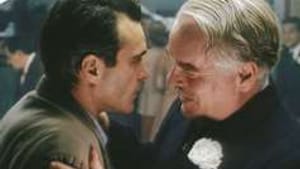Stay in the Loop
BSR publishes on a weekly schedule, with an email newsletter every Wednesday and Thursday morning. There’s no paywall, and subscribing is always free.
Is this Citizen Kane, or The Lost Weekend?
Paul Thomas Anderson's "The Master' (1st review)

The Master is Paul Thomas Anderson. Master of casting brilliant actors and culling outstanding performances that lift off a screen. Master of the visual, with sumptuous photography and a connoisseur's eye for intricate period detail.
Also, master at pulling the wool over our eyes.
This is a big movie about a small man and a small movie about a big man. I'll explain.
The raw waste of a man— Freddie Quell, played by Joaquin Phoenix— occupies the center of the film. Freddie is a tragic, broken World War II vet who has literally no character arc. He never even almost succeeds. Then he falls under the sway of "The Master," Lancaster Dodd (Philip Seymour Hoffman), a forceful religious leader partly modeled after Scientology founder L. Ron Hubbard.
Freddie is a real symbol of the most damaged of the young men (and now women) who live in the constant fear and abuse of their wartime experiences. Anderson displays Freddie's deterioration in long, beautiful, color-saturated exposition. And the human waste is spectacular: We see every twisted muscle, every crooked grimace. Phoenix sears the screen with pain. But a wrenching performance is no substitute for a story.
Fire and brimstone
Yet the most fascinating story— and the film I was led by the title to expect— concerns how a demigod like Dodd can rise by seeming to fill the vacuum in a world full of empty lives.
This small movie is imbued with a magical actor: Philip Seymour Hoffman. As excellently labored as Phoenix's work is, Hoffman as Dodd breathes power and layers, rendering his performance ever more penetrating, effortless and mesmerizing. From his paternal twinkle to his fiery brimstone to his pious rejections, Hoffman owns every corner of his character.
What a fascinating character this Master could be. How, I wondered, did he form? How did he find this calling? Does he believe his fantasies?
But The Master never explores why and how Dodd came to his doctrine. He just is. And there's the rub. We're subjected to Phoenix's naked agony of a performance as a substitute for a story.
Woman behind the man
The Master's wife, played by the delicate warrior Amy Adams, relates the tale of how a woman in her time and position accumulates and maintains power. But how did this ingénue beauty evolve into the backbone behind the paunchy, middle-aged, divorced New Messiah? That intriguing question too goes unexamined in The Master.
Anderson is no stranger to the dominant mentor/devotee relationship. The exalted pedestal, idol worship and ultimate rejection have been explored in his comedies, dramas and tragedies alike. Witness the coldness in Hard Eight, the exuberant selfishness in Boogie Nights, the emotional absence of Magnolia, and the roaring deaf ambition in There Will Be Blood. So if you didn't get the message— "Be careful what you wish for"— in his early films, The Master will smack you on the head with it yet again.
I've asked some of the film's admirers why they like The Master. I haven't received an answer beyond the undisputable beautiful settings and brilliant performances, other than the film's denigration of self-appointed demigods. But religious charlatans make such easy targets. The Master never explores the bigger and tougher question: why and how the irrational human yearning for answers to unanswerable questions renders so many of us vulnerable to false messiahs.
Aristotle's check list
Aristotle gave us the six elements of drama. The Master hits one of them—spectacle— really well and really hard. But spectacle isn't story. It's not discovery. It's not character development.
The Master does present some compelling scenes. What a fascinating challenge the Master confronts at the party! What an interesting moment when one of Dodd's most ardent followers questions the process! What a dynamic emotional banquet of a scene when the two men are jailed!
But great scenes must have a spine and characters worth rooting for. Since Freddie Quell and Lancaster Dodd are both irredeemable and unforgivable, their yin and yang relationship lacks the essential "So what?" element.
I went to The Master expecting Citizen Kane; I got The Lost Weekend instead. Orson Welles may have fictionalized William Randolph Hearst (much as Anderson here fictionalizes L. Ron Hubbard), but he provided the higher truth of good fiction— specifically, insight into the motivations and perceptions of the powerful as they climb the ladder of success. Welles understood that when your subject is American megalomania, you must focus on the man behind the curtain, not the man falling down in front of it.♦
To read another review by Robert Zaller, click here.
To read a response, click here.
Also, master at pulling the wool over our eyes.
This is a big movie about a small man and a small movie about a big man. I'll explain.
The raw waste of a man— Freddie Quell, played by Joaquin Phoenix— occupies the center of the film. Freddie is a tragic, broken World War II vet who has literally no character arc. He never even almost succeeds. Then he falls under the sway of "The Master," Lancaster Dodd (Philip Seymour Hoffman), a forceful religious leader partly modeled after Scientology founder L. Ron Hubbard.
Freddie is a real symbol of the most damaged of the young men (and now women) who live in the constant fear and abuse of their wartime experiences. Anderson displays Freddie's deterioration in long, beautiful, color-saturated exposition. And the human waste is spectacular: We see every twisted muscle, every crooked grimace. Phoenix sears the screen with pain. But a wrenching performance is no substitute for a story.
Fire and brimstone
Yet the most fascinating story— and the film I was led by the title to expect— concerns how a demigod like Dodd can rise by seeming to fill the vacuum in a world full of empty lives.
This small movie is imbued with a magical actor: Philip Seymour Hoffman. As excellently labored as Phoenix's work is, Hoffman as Dodd breathes power and layers, rendering his performance ever more penetrating, effortless and mesmerizing. From his paternal twinkle to his fiery brimstone to his pious rejections, Hoffman owns every corner of his character.
What a fascinating character this Master could be. How, I wondered, did he form? How did he find this calling? Does he believe his fantasies?
But The Master never explores why and how Dodd came to his doctrine. He just is. And there's the rub. We're subjected to Phoenix's naked agony of a performance as a substitute for a story.
Woman behind the man
The Master's wife, played by the delicate warrior Amy Adams, relates the tale of how a woman in her time and position accumulates and maintains power. But how did this ingénue beauty evolve into the backbone behind the paunchy, middle-aged, divorced New Messiah? That intriguing question too goes unexamined in The Master.
Anderson is no stranger to the dominant mentor/devotee relationship. The exalted pedestal, idol worship and ultimate rejection have been explored in his comedies, dramas and tragedies alike. Witness the coldness in Hard Eight, the exuberant selfishness in Boogie Nights, the emotional absence of Magnolia, and the roaring deaf ambition in There Will Be Blood. So if you didn't get the message— "Be careful what you wish for"— in his early films, The Master will smack you on the head with it yet again.
I've asked some of the film's admirers why they like The Master. I haven't received an answer beyond the undisputable beautiful settings and brilliant performances, other than the film's denigration of self-appointed demigods. But religious charlatans make such easy targets. The Master never explores the bigger and tougher question: why and how the irrational human yearning for answers to unanswerable questions renders so many of us vulnerable to false messiahs.
Aristotle's check list
Aristotle gave us the six elements of drama. The Master hits one of them—spectacle— really well and really hard. But spectacle isn't story. It's not discovery. It's not character development.
The Master does present some compelling scenes. What a fascinating challenge the Master confronts at the party! What an interesting moment when one of Dodd's most ardent followers questions the process! What a dynamic emotional banquet of a scene when the two men are jailed!
But great scenes must have a spine and characters worth rooting for. Since Freddie Quell and Lancaster Dodd are both irredeemable and unforgivable, their yin and yang relationship lacks the essential "So what?" element.
I went to The Master expecting Citizen Kane; I got The Lost Weekend instead. Orson Welles may have fictionalized William Randolph Hearst (much as Anderson here fictionalizes L. Ron Hubbard), but he provided the higher truth of good fiction— specifically, insight into the motivations and perceptions of the powerful as they climb the ladder of success. Welles understood that when your subject is American megalomania, you must focus on the man behind the curtain, not the man falling down in front of it.♦
To read another review by Robert Zaller, click here.
To read a response, click here.
What, When, Where
The Master. A film directed by Paul Thomas Anderson. For Philadelphia area show times, click here.
Sign up for our newsletter
All of the week's new articles, all in one place. Sign up for the free weekly BSR newsletters, and don't miss a conversation.
 Susan Beth Lehman
Susan Beth Lehman